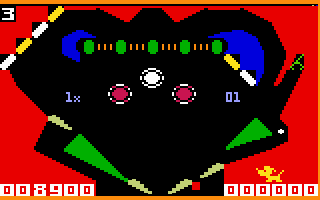Retro Replay Review
Gameplay
Pinball offers a classic arcade-style experience that’s both accessible for newcomers and challenging for seasoned players. You start with five balls and aim to rack up the highest possible score by striking bumpers, ramps, and targets scattered across a multi-tiered pinball table. The core mechanics revolve around precise timing and flipper control, rewarding players who master the delicate balance between aggressive shots and careful nudges.
(HEY YOU!! We hope you enjoy! We try not to run ads. So basically, this is a very expensive hobby running this site. Please consider joining us for updates, forums, and more. Network w/ us to make some cash or friends while retro gaming, and you can win some free retro games for posting. Okay, carry on 👍)
The table is divided into three distinct screens, each presenting its own layout and escalating difficulty. On Screen One, you’ll find straightforward bumpers and easily reachable targets—perfect for learning timing and table geometry. Once you’ve hit the required targets, a white “advance” cup appears, and sinking the ball in it takes you to the next level. Screens Two and Three introduce tighter lanes, faster bumpers, and trickier target combinations that demand quick reflexes.
Losing the ball on Screens Two or Three doesn’t immediately cost you one of your five lives; instead, you drop back down to the previous screen. This mechanic adds a forgiving layer to the challenge, letting you regain momentum without losing a ball outright. However, if you’re on Screen One and the ball drains, one of your precious five balls is lost. The game ends when all balls have drained, making each life count toward the ultimate high-score chase.
For two-player mode, Pinball switches to a turn-based competition: Player One takes a shot until all balls are lost, then Player Two tries to outscore them. This classic “take turns” approach keeps head-to-head matches simple yet fiercely competitive, and it’s ideal for living room showdowns or quick arcade breaks.
Graphics
Though not a graphical powerhouse by modern standards, Pinball’s visuals shine through their clarity and purposeful design. Each of the three screens features a distinct color palette and motif, helping players instantly recognize where they are. Screen One has vibrant primary colors, while Screens Two and Three introduce deeper hues and more metallic accents to convey rising difficulty.
The ball’s movement is smooth and consistent, with subtle trails and physics-based bounce animations that feel satisfying on impact. Bumpers flash and ripple when struck, and ramps display slight animations as the ball rolls over them, ensuring that every successful shot delivers instant visual feedback. Even simple target hits trigger small spark-like effects that enhance the sense of reward.
Background elements remain unobtrusive, allowing you to focus on the fast-paced action in the foreground. Detailed edge trim, thematic decals around the playfield, and animated bumpers all contribute to an immersive tabletop atmosphere. Whether playing on a small screen or a CRT-styled arcade cabinet, the stylized simplicity of Pinball’s graphics keeps the table legible and engaging at all times.
Story
Pinball doesn’t boast a traditional narrative or characters, but it weaves a compelling meta-story through its level progression and scoring milestones. Each screen acts as a chapter in a silent contest against gravity and mechanical precision. As you advance, the challenge intensifies, telling the tale of an ever-harder table that refuses to give up points.
The lack of a plot is actually a strength here, since the “story” becomes the very act of playing. Your personal journey—from learning the controls on the first screen to conquering the most intricate targets on the third—creates memorable highs and lows. Moments like effortlessly clearing a sequence of bumpers or saving a draining ball by a hair’s breadth become narrative beats in your own gameplay tale.
For many, the compelling thread is simply the pursuit of a higher score. The absence of cutscenes or dialog keeps the pace brisk, and every session feels like a fresh opportunity to write a new high-score chapter. In this sense, the story of Pinball is the story of you versus the table, with each ball serving as a new paragraph in your high-score saga.
Overall Experience
Pinball successfully captures the essence of real-world pinball without the need for bulky hardware. Its straightforward premise—five balls, three screens, one goal—delivers immediate pick-up-and-play appeal while offering deep nuance for players who want to steadily improve. The level-based structure and return-to-lower-screen mechanic strike a satisfying balance between challenge and fairness.
Whether you’re revisiting childhood memories of arcade halls or discovering pinball for the first time, this simulation provides a gratifying tabletop experience that’s built to last. Leaderboards and local two-player matches ramp up the competitive stakes, making it perfect for friendly gatherings or solo practice sessions. The game’s compact design means you can jump in for a quick round or settle in for marathon high-score attempts.
In the end, Pinball doesn’t reinvent the wheel—it refines it. Solid physics, clear visuals, and tiered difficulty ensure that each shot feels consequential, and the steady progression across three unique screens keeps boredom at bay. For anyone seeking an authentic, no-frills pinball challenge, this game is a standout tabletop simulation that rewards skill, patience, and a love for that distinctive clack-clack sound of a well-played ball.
 Retro Replay Retro Replay gaming reviews, news, emulation, geek stuff and more!
Retro Replay Retro Replay gaming reviews, news, emulation, geek stuff and more!








Reviews
There are no reviews yet.